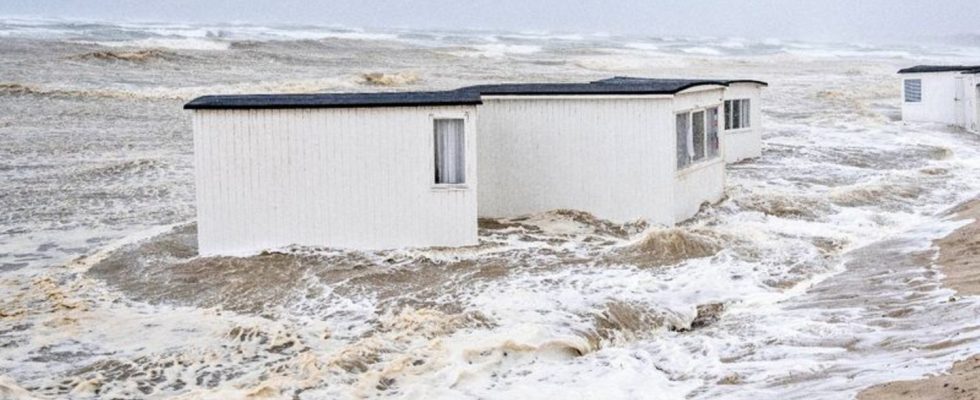Global warming
EU Commission: Adapt better to the climate crisis with more data
An approaching storm led to floods, fires and water damage in Scandinavia last summer. photo
© Henning Bagger/Ritzau Scanpix Photo/AP/dpa
According to experts, Europe is warming faster than any other continent – and is not adequately prepared for it. The EU Commission wants to change this with various measures.
More knowledge, more data and more resilient infrastructure: In view of the increasing impact of the From the perspective of the EU Commission, Europe must better prepare for climate risks and strengthen the resilience of society and the economy.
For example, climate risks should be given greater consideration in budget plans, in the planning and maintenance of infrastructure and in disaster protection systems, as suggested by the authority’s proposals for dealing with climate risks presented on Tuesday in Strasbourg.
The proposals are a “loud call for action at all levels,” said Commission Vice President Maros Sefcovic. “Last year was by far the warmest on record and Europe must therefore strengthen its resilience to the impacts of climate change by identifying risks, improving preparedness and fine-tuning policies across all areas,” he said.
Early warning systems, combating climate disinformation and adapted spatial planning including critical infrastructure are solutions for greater climate resilience. Climate resilience is about adapting ecosystems and society to global warming.
Climate risk report warns of droughts and heat
With this initiative, the EU Commission is responding to a climate risk report published on Monday by the European Environment Agency (EEA). This confirmed that Europe had so far been inadequately prepared: Europe was the fastest warming continent and was confronted with climate risks that were developing faster than society’s preparedness and willingness to act, it was said. Among other things, persistent and widespread droughts pose a significant threat to yields, food security and drinking water supplies. Heat is the largest and most urgent climate risk to human health.
In order to avoid the worst consequences of the climate crisis and to protect health, the economy and ecosystems, greenhouse gas emissions must above all be reduced, the Commission has now said. Since the effects of climate change are already noticeable and the risks continue to increase, measures to adapt to climate change are also essential.
Clear responsibilities are important
In the Commission’s view, clear responsibilities and risk bearers are an adjustment screw. The member states should ensure this. According to the authority’s demands, national, regional and local levels should work more closely together – “to ensure that knowledge and resources are made available where they are most effective”. Although climate resilience is increasingly being taken into account in all policy areas, there are still deficits in planning and implementation at the national level.
Connections need to be better understood – more data
Policy makers, companies and investors need to better understand the connections between climate risks, investments and long-term financing strategies. Among other things, the authority wants to improve access to data, models and scenarios – from early warning systems to long-term planning. It is also important to monitor and combat disinformation about climate change. Climate risks should also play a role in disaster protection systems.
Public and private investment necessary
Sufficient public and private funds are also crucial for climate resilience, it said. The Commission therefore wants to ensure that climate resilience is part of all relevant EU spending and work with the financial sector to better mobilize public and private investments. In addition, the authority is ready to support member states in incorporating climate risks into national budget procedures.
The costs of investing to reduce vulnerability to climate risks are lower than the sums that would have to be raised after forest fires, floods or crop failures, it said. According to estimates from the Commission, this damage could reduce the EU’s gross domestic product by around seven percent by the end of the century. But investments in climate-resistant buildings, transport and energy networks could also be good business opportunities – and create both jobs and clean energy.
Infrastructure must be prepared for climate risks
In the authority’s opinion, climate risks should also be more closely integrated into the planning and maintenance of critical infrastructure – such as transport and energy. Infrastructure systems are at considerable risk from floods, forest fires or high temperatures.
Federal Environment Minister Steffi Lemke welcomed the European Commission’s plans for the community of states. “In Germany we are moving forward with the first federal law for climate adaptation.” This means that protection against the consequences of the climate crisis will be anchored in law as a central task at all levels of government. A new climate adaptation strategy is currently being worked on in Germany.

